2025 Jeep Grand Cherokee Vs.
2025 Toyota 4Runner Comparison
Our Jeep Grand Cherokee vs. Toyota 4Runner review compares two capable midsize SUVs that are robust, durable, and ready for rougher trails. These two models share high ground clearance and excellent fuel economy. However, where the Toyota 4Runner prioritizes size, the Jeep Grand Cherokee offers a stronger engine, a larger fuel tank, increased towing capacity, and superior features.
The team here at Bomnin CDJR Doral has seen how the Jeep Grand Cherokee enhances the lifestyles of our clients. Read on to learn more about these dynamic machines.
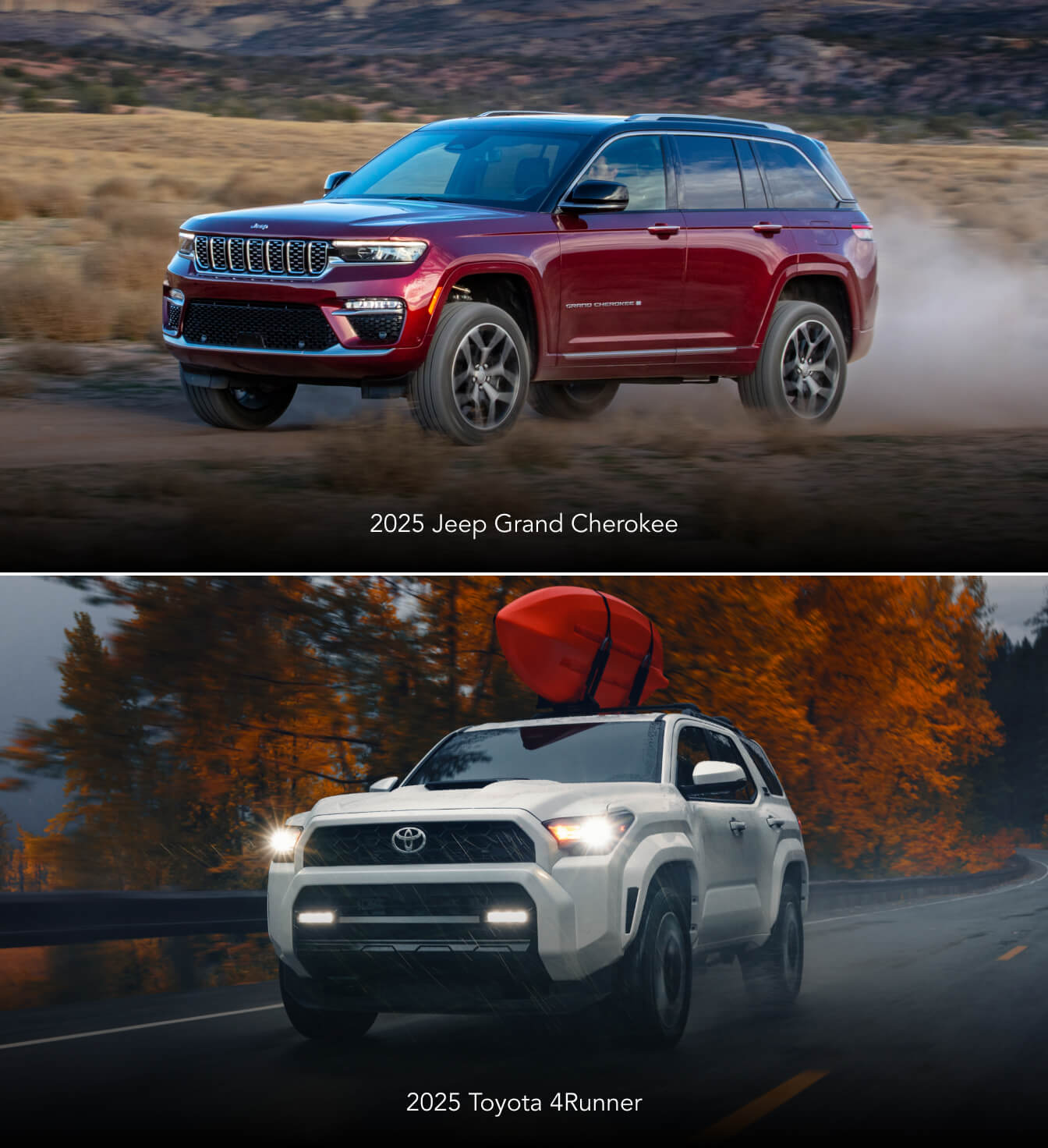
Engines & Specs
The standard specs of these two SUVs favor the 2025 Jeep Grand Cherokee for sale, thanks to its 293-horsepower standard engine. Even hybrid options favor the Jeep SUV, with the Grand Cherokee 4xe making more combined horsepower.
- Jeep Grand Cherokee: The 3.6-liter V-6 engine that motivates all Jeep Grand Cherokee models creates 293 horsepower and 260 pound-feet of torque. For an even more responsive engine, the 4xe plug-in hybrid variant makes 375 horsepower and 470 pound-feet of torque.
- Toyota 4Runner: The standard 2.4-liter turbocharged four-cylinder 4Runner engine makes more torque, but only 278 horsepower. If you bring hybrid engines into the mix, the 2.4-liter turbo hybrid four-cylinder produces 326 horsepower and 465 pound-feet of torque.
 Jeep Grand Cherokee |  Toyota 4Runner | |
|---|---|---|
| Engine: | 3.6L V-6 | 2.4L turbo 4-cyl |
| Horsepower: | 293 | 278 |
| Torque: | 260 lb-ft | 317 lb-ft |
| Transmission: | TorqueFlite 8-speed auto | 8-speed auto |
| Drivetrain: | 2WD, 4WD available | 2WD, 4WD available |
| Max EPA-Est. MPG (City / Hwy / Cmb): | 19 / 26 / 221 | 20 / 26 / 222 |
| Fuel Tank Size: | 23 gal | 19 gal |
| Length: | 193.5 in | 194.9 in |
| Width: | 77.5 in | 77.9 - 77.9 in |
| Height: | 70.8 - 70.9 in | 72.6 - 75.5 in |
| Seats: | 5 | 5 - 7 |
| Base Curb Weight: | 4,238 lbs | 4,455 lbs |
| Cargo Space (Trunk / To 2nd / To 1st): | NA / 37.7 / 70.8 cu ft | 12.1 / 48.4 / 90.2 cu ft |
| Max Towing Capacity: | 6,200 lbs3 | 6,000 lbs4 |
| Standard & Available Interior Feature Highlights: |
|
|
| Standard & Available Exterior Feature Highlights: |
|
|
| IIHS Safety Rating: | Top Safety Pick5 | No Award (2024)6 |
| Factory Warranty: | 3-yr/36,000-mi7 | 3-yr/36,000-mi7 |
| Jeep Grand Cherokee Inventory | Toyota 4Runner Inventory |
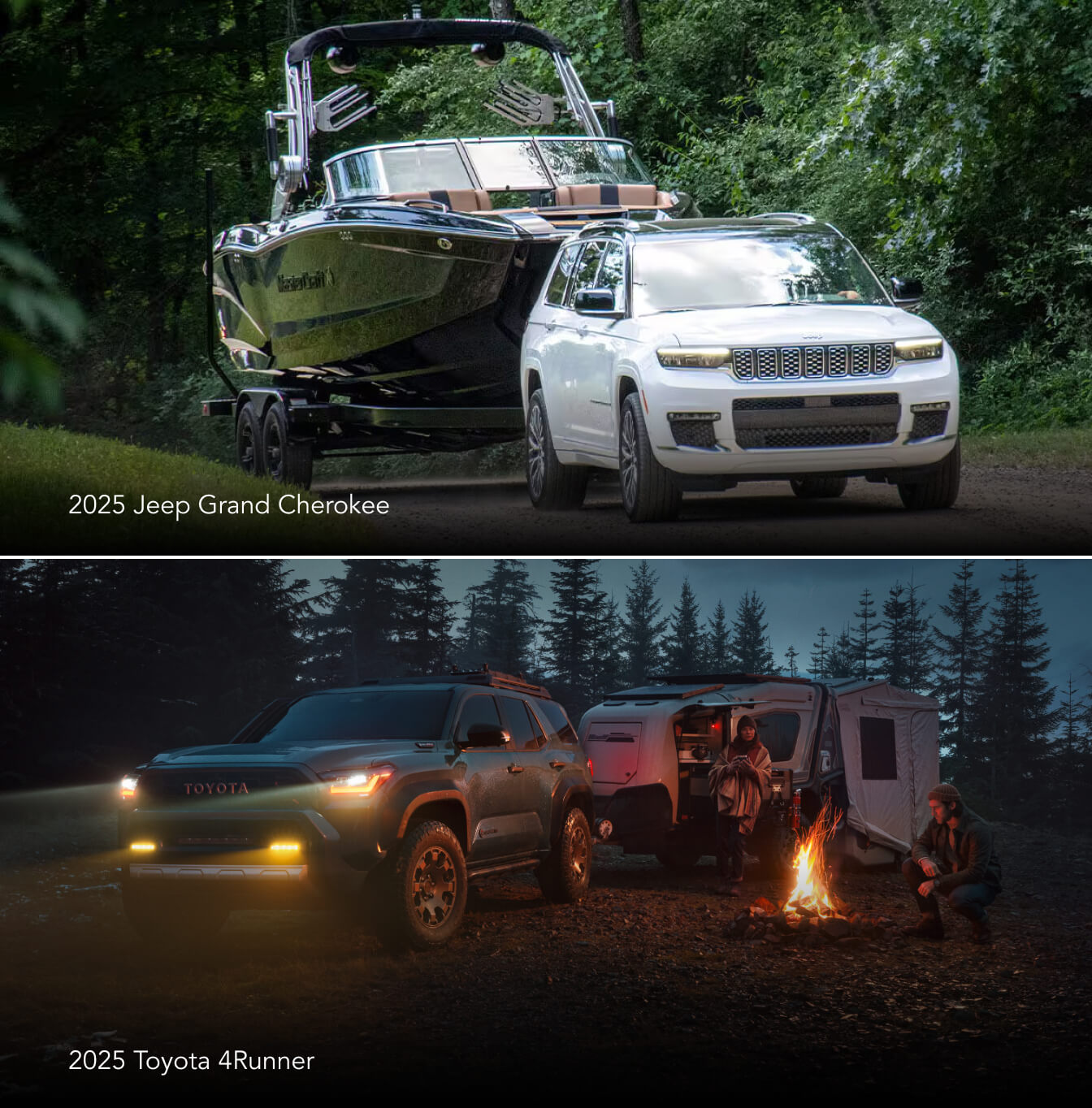
Towing & Off-Road
As a standout member of our Jeep towing by model list, the Grand Cherokee has slightly more towing capacity than the 4Runner, at 6,200 pounds vs. 6,000 pounds.3,4 It also has more ground clearance on off-roading trims with specialized Quadra-Lift air suspension.
- Jeep Grand Cherokee: Enjoy an extra 200 pounds of towing capacity, up to 10.9 inches of ground clearance, semi-active damping, electronic slip differentials, and so much more on the Overland and Summit trim levels.
- Toyota 4Runner: An expressive off-roader in its own right, the 4Runner has a 6,000-pound tow rating,4 up to 10.1 inches of ground clearance, and an electronically controlled locking rear differential on its TRD Pro trim.
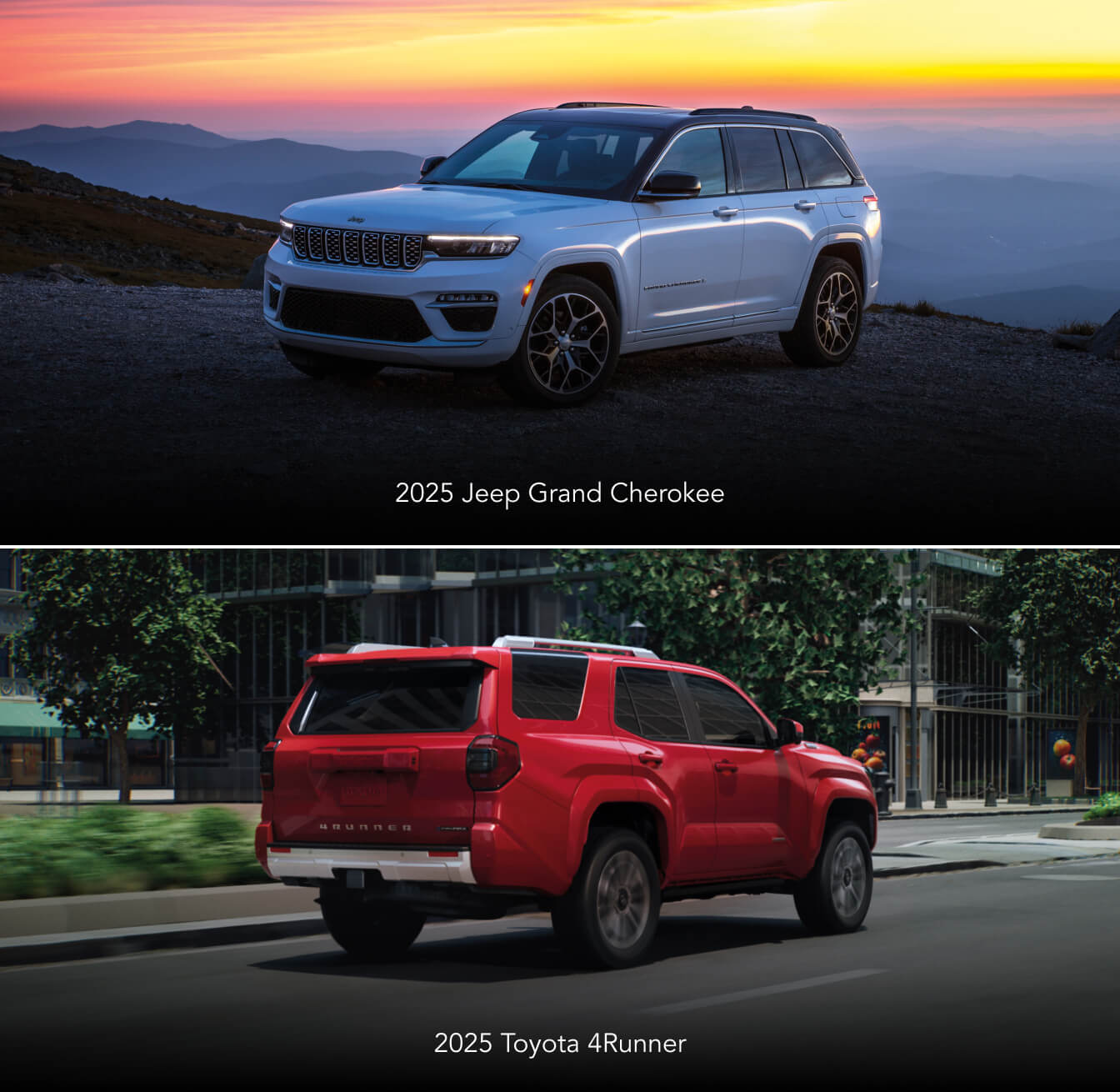
Fuel Economy
Fuel economy is essentially a tie between the models. The EPA estimates both have 22 MPG (Combined) with their standard engines, though the Grand Cherokee has one less city MPG.1,2
- Jeep Grand Cherokee: With an EPA-estimated 19/26/22 MPG (City/Highway/Combined),1 the Grand Cherokee keeps up with rivals. Its 23-gallon fuel tank ensures you will always have much more range than the 4Runner.
- Toyota 4Runner: The base engine of the 4Runner achieves an EPA-estimated 20/26/22 MPG (City/Highway/Combined).2 Its smaller fuel tank will mean more common stops on road trips.
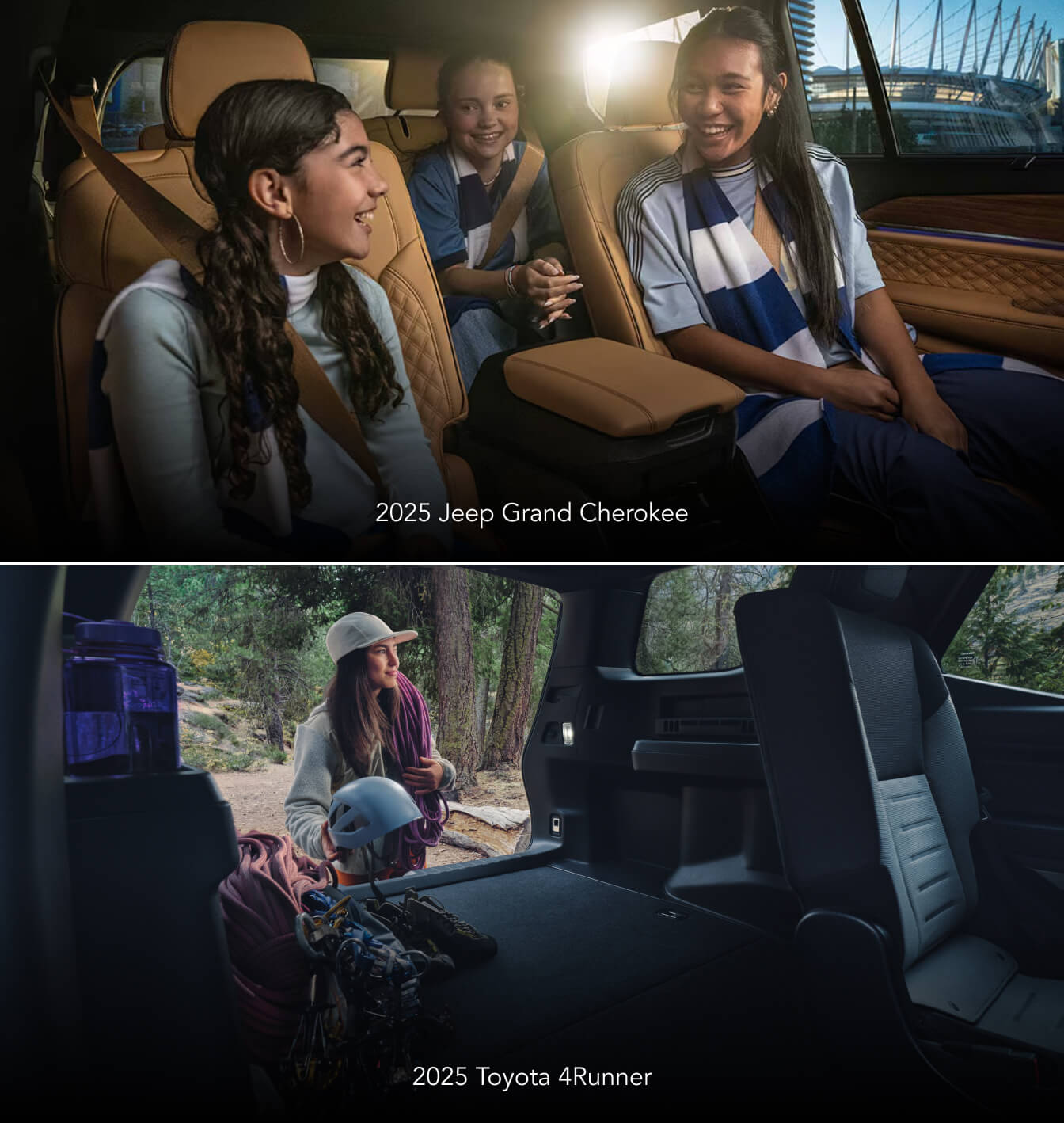
Size & Cargo
The 4Runner has the larger dimensions, giving it more storage space, but it doesn't prioritize its passengers as well as the Grand Cherokee does. Sporting a rear legroom measurement of 34.8 inches, the 4Runner seems cramped compared to the 38.2 inches of the Jeep SUV.
- Jeep Grand Cherokee: With a maximum 70.8 cubic feet of total cargo volume, the Grand Cherokee is plenty spacious for vacations, camping trips, or moving days. When you need to seat five, you'll have more than 140 cubic feet of passenger space.
- Toyota 4Runner: While the 4Runner impresses with a maximum 90.2 cubic feet of cargo space, it disappoints with just 34.8 inches of second-row passenger space. A third row can be added with even more cramped specs.
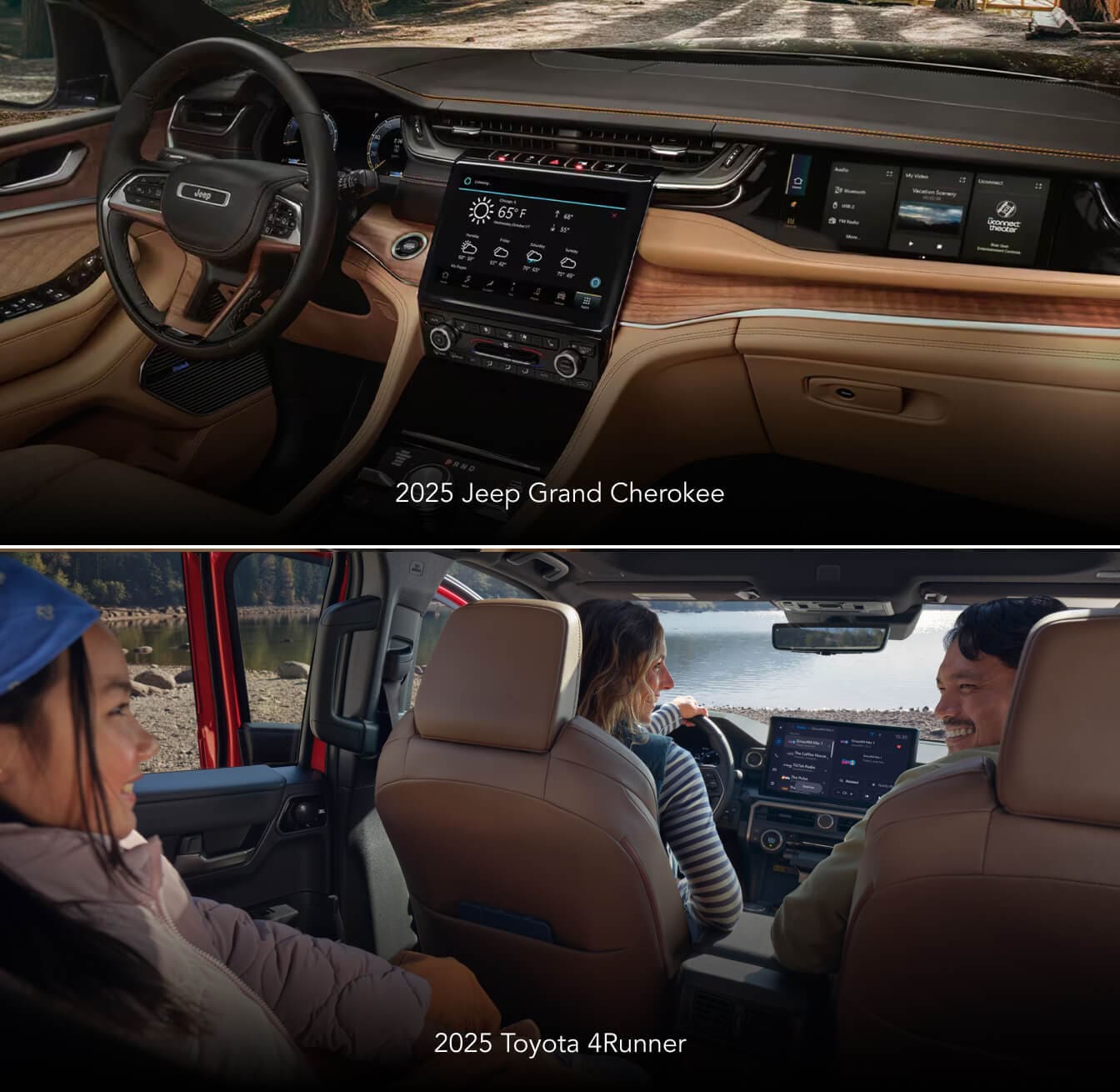
Interior & Technology
The Jeep Grand Cherokee leaves the 4Runner in the dust in terms of technology. From ventilated rear seats to five more speakers on its premium sound system, the Jeep SUV takes this category by storm.
- Jeep Grand Cherokee: Climate systems, like standard two-zone or available four-zone, work to keep your family cool in any state. Available 12-way seating ensures your back is well-supported during long drive.
- Toyota 4Runner: A standard single-zone climate system is rather lackluster for an SUV with three possible rows. Standard six-way seats (that only upgrade to eight-way) are also suboptimal for growing families.
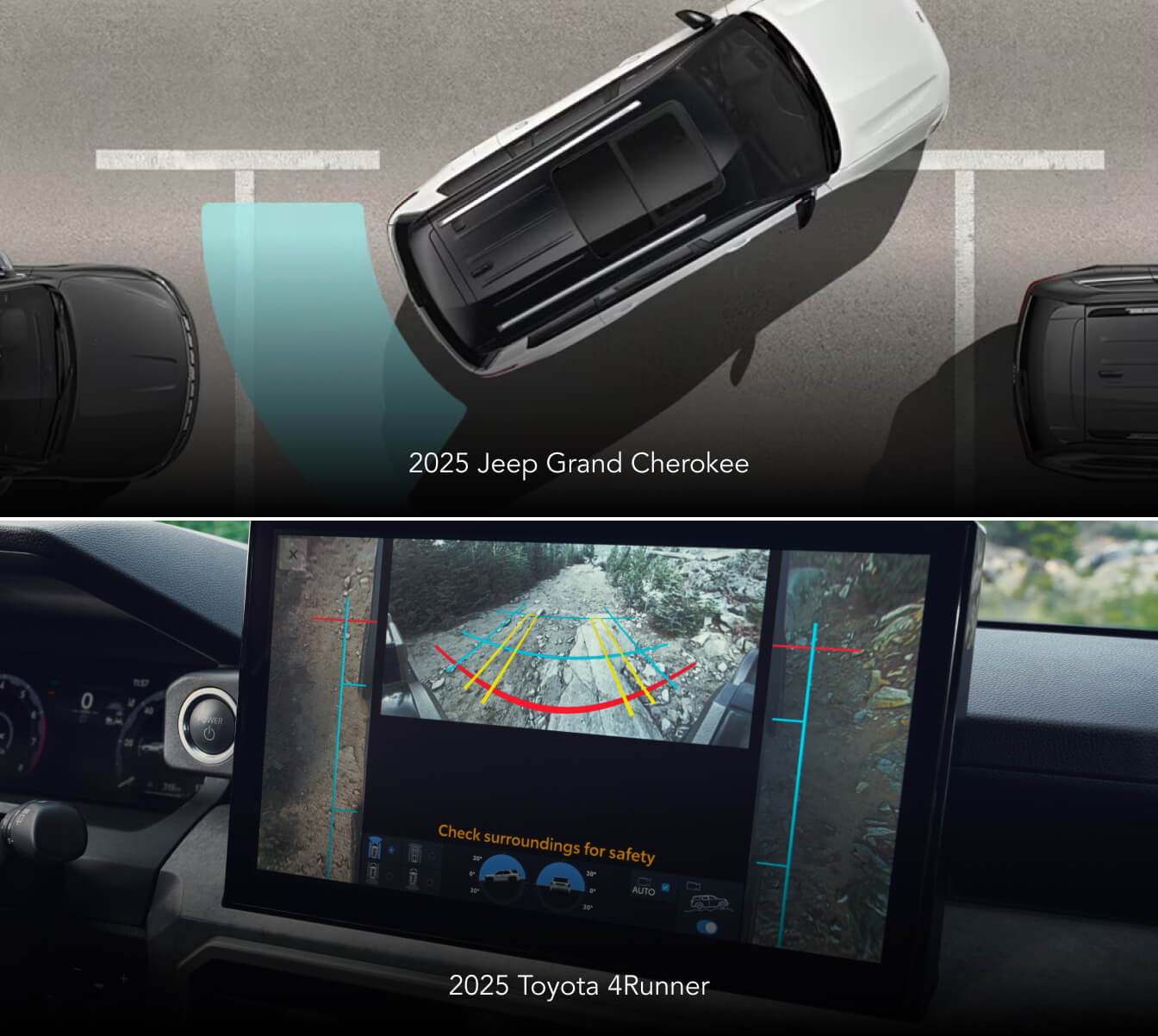
Safety & Reliability
Thanks to elevated safety features, the Jeep Grand Cherokee is the preferred, safe pick.
- Jeep Grand Cherokee: A Jeep Grand Cherokee lease offers you access to a car that is the proud recipient of an IIHS Top Safety Pick Award.5 That's thanks to impressive safety sensors, like Parallel Park Assist, Lane Keep Assist, and more.
- Toyota 4Runner: Toyota Safety Sense 3.0 is a good suite of technologies, but the 4Runner safety options pale in comparison to the Grand Cherokee.
Jeep Grand Cherokee vs. Toyota 4Runner: Pros & Cons
Jeep Grand Cherokee: Pros & Cons
Pros
- Stronger engine
- More fuel capacity
- Much more rear-row legroom
- More towing capacity
- More expressive convenience features
- Preferable safety options
Cons
- Less cargo space
Toyota 4Runner: Pros & Cons
Pros
- More cargo space
Cons
- Lower horsepower on standard engine
- Lower range due to smaller fuel tank
- Larger size problem for some trails
- Lower towing capacity
- Less advanced comfort features
- Less advanced safety options
Frequently Asked Questions About the Jeep Grand Cherokee vs. Toyota 4Runner Comparison
Which can tow more: Jeep Grand Cherokee or Toyota 4Runner?
The Jeep Grand Cherokee is slightly more capable than the Toyota 4Runner. The 3.6-liter V-6 of the Grand Cherokee can handle trailers of up to 6,200 pounds with a tongue weight of 620 pounds.3 Meanwhile, the 4Runner can only tow 6,000 pounds when properly equipped – a relatively small difference. But that extra weight can help compensate for an unbalanced hitch.
Which has more cargo space: the Jeep Grand Cherokee or the Toyota 4Runner?
The Toyota 4Runner has somewhat more cargo space than the Jeep Grand Cherokee. This isn't surprising, as the 4Runner is the larger vehicle with third-row configurations. The Grand Cherokee is still incredibly spacious and a perfect family companion, with up to 70.8 cubic feet of overall storage volume. Please visit us to explore the roomy new Jeep Grand Cherokee.
Which is better: Jeep Grand Cherokee or Toyota 4Runner?
The choice between the Jeep Grand Cherokee and the Toyota 4Runner ultimately depends on personal preference, but we prefer the Jeep SUV. The Grand Cherokee boasts a superior feature lineup and an engine with significantly higher horsepower than either of the 4Runner's options. The 4Runner doesn't have a 2025 IIHS Top Safety Pick Award,6 an accolade that the Jeep Grand Cherokee holds with pride.5
Read Our Jeep Grand Cherokee Reviews:
1EPA-estimated 19 city MPG with 3.6-liter V-6 and 8-speed automatic transmission. EPA-estimated 26 hwy MPG with 3.6-liter V-6 and 8-speed automatic transmission. EPA-estimated 22 cmb MPG with 3.6-liter V-6 and 8-speed automatic transmission. Actual mileage may vary.
2Use for comparison purposes only. Your mileage will vary for many reasons, including your vehicle's condition and how/where you drive. See www.fueleconomy.gov.
3When properly equipped. See dealer for details.
4Before towing, confirm your vehicle and trailer are compatible, hooked up and loaded properly and that you have any necessary additional equipment. Do not exceed any Weight Ratings and follow all instructions in your Owner's Manual. The maximum you can tow depends on base curb weight plus the total weight of any cargo, occupants, and added vehicle equipment. "Added vehicle equipment" includes additional standard/optional equipment and accessories added by the manufacturer, dealers, and/or vehicle owners. The only way to be certain of your vehicle's exact curb weight is to weigh your vehicle without passengers or cargo. [Calculated with the new SAE J2807 method.] Installation of a tow hitch receiver or other accessories located near the rear bumper or side-door kick sensors may require disabling or removing the kick sensor, and the sensor operation setting in your vehicle should be turned off. See Owner's Manual for limitations.
5Reference to this third-party claim is solely for informational purposes and not to be relied upon. For details regarding this award, visit https://www.iihs.org/ratings/vehicle/Jeep/grand-cherokee-4-door-suv/2025
6Reference to this third-party claim is solely for informational purposes and not to be relied upon. For details regarding this award, visit https://www.iihs.org/ratings/vehicle/toyota/4runner-4-door-suv/2024
7Warranties listed on this web page shall not be solely relied upon. Warranties may be subject to specific terms, restrictions, exclusions, and fees. Additional warranty information may be obtained by visiting the official website of the warranty provider. Contact our dealership for complete details.